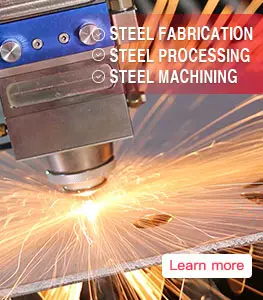Welcome to BBN Steel Materials Factory
What is the difference between S275 and S355 steel?
S275 steel and S355 structural steel are two types of steel that are used in construction, engineering, and manufacturing industries. They are both high-strength structural steels, but they have different properties and specifications.
S275 structural steel is a low-carbon steel that is used in structural applications. It has a minimum yield strength of 275 N/mm² which makes it a versatile and cost-effective material. S275 steel is mainly used in bridge, building, and construction industries.
S275 steel has good machinability, weldability, and formability properties. It can be easily cut and welded into different shapes and sizes without compromising its structural integrity. S275 steel is also resistant to corrosion and rust, which makes it ideal for outdoor structures.
The chemical composition of S275 steel includes carbon, manganese, phosphorus, sulfur, silicon, and copper. The carbon content in S275 steel is relatively low, making it less brittle and more ductile than other types of steel. Grade S275 include S275JR, S275J0, S275J2, etc.
S355 structural steel is a structural steel that is used in applications where a high-strength and durable material is required. S355 steel has a minimum yield strength of 355 N/mm² which allows it to withstand high stress and pressure. S355 steel is mainly used in building and construction industries for its high strength and durability.
S355 steel has good machinability, weldability, and formability properties. It can be easily cut and welded into different shapes and sizes without compromising its structural integrity. S355 steel is also resistant to corrosion and rust, which makes it ideal for outdoor structures. Grade 355 include S355JR, S355J0, S355J2, S355K2. etc.
The chemical composition of S355 steel includes carbon, manganese, phosphorus, sulfur, silicon, and copper. The carbon content in S355 steel is slightly higher than S275 steel, making it more brittle and less ductile. However, S355 steel is still considered a low-carbon steel because it has less than 0.2% carbon by weight.
S275 and S355 Structural Steel Mechanical Properties
| Grades | Tensile strength, Rm, MPa (N/mm2) | 0,2% Yield strength, Rp0, 2min, (MPa) | Brinell hardness, HB max |
| S275 | 370 – 530 | 275 | 121 – 163 |
| S355 | 470 – 630 | 355 | 146 – 187 |
Differences between S275 and S355 Steel
The main differences between S275 and S355 steel are their strength and chemical composition. The strength of S355 steel is higher than S275 steel, so it has a higher maximum tensile strength and yield strength than S275 steel. However, S275 steel has a higher ductility and toughness than S355 steel, which means it can deform and absorb energy better than S355 steel.
Another difference between S275 and S355 steel is their chemical composition. S275 steel contains a lower carbon content, phosphorus, and sulfur than S355 steel. S355 steel has a higher carbon content and contains more manganese and silicon than S275 steel. This increases the strength and hardness of S355 steel but makes it less ductile and tough than S275 steel.
S355 steel is also more expensive than S275 steel due to its higher strength and durability. However, the higher cost of S355 steel is often offset by its lower maintenance and repair costs over time.
Applications of S275 and S355 Steel
S275 and S355 steel are both used in a wide range of applications, including:
1. Building and construction industries: S275 and S355 steel are used in the construction of buildings, bridges, and other structures due to their high strength and durability.
2. Infrastructure industries: S355 steel is often used in infrastructure projects such as highways, railways, and airports because of its high strength and resistance to environmental factors.
3. Manufacturing industries: S275 and S355 steel are used in the manufacturing of machinery, equipment, and vehicles due to their high strength and durability.
4. Oil and gas industries: S355 carbon steel is often used in the oil and gas industry due to its high strength and resistance to corrosion.
.webp)
.webp)
.webp)
.webp)
.webp)
.webp)
.webp)
.webp)
.webp)



Leave a Message